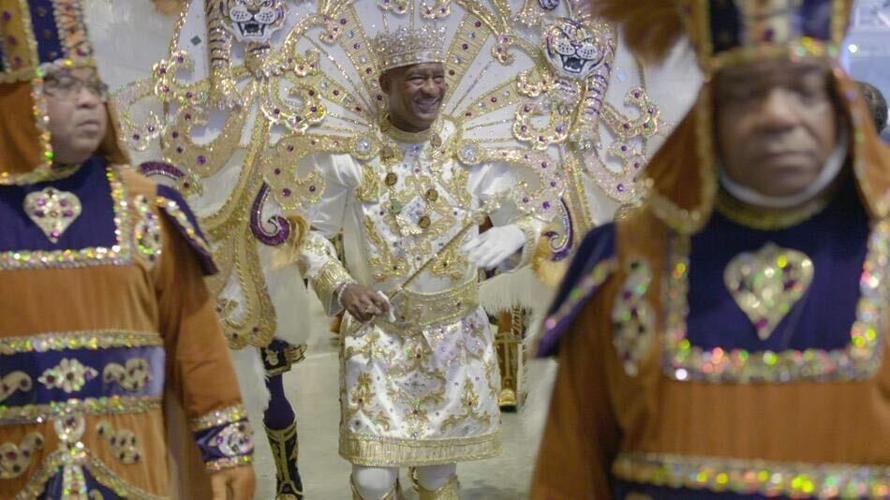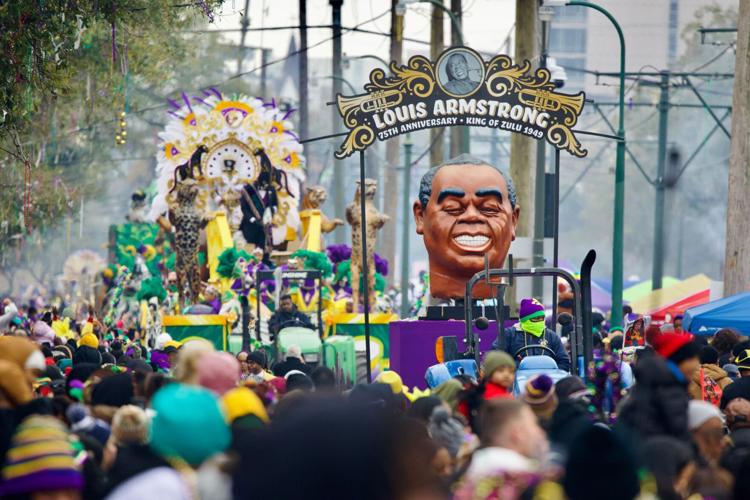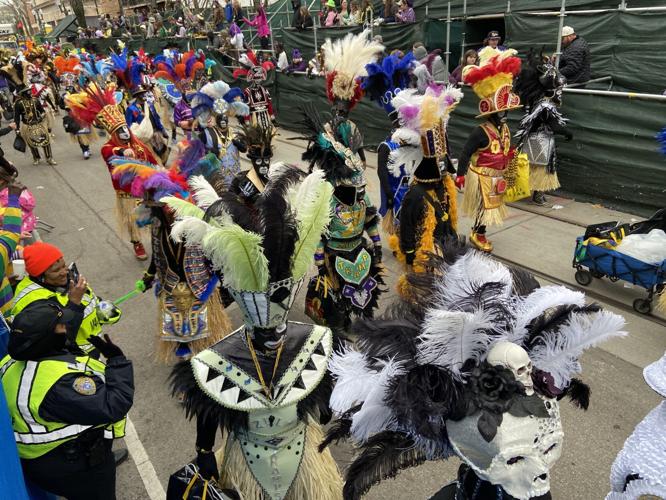The journey from Brooklyn to New Orleans is long — just short of 20 hours behind the wheel if you’re making good time, not counting stops for bathrooms and Red Bull.
But in June 2020, right smack in the middle of those scary, early days of the global COVID-19 shutdown, actor and Oscar-winning documentarian Fisher Stevens hit the open road with fellow filmmaker Matthew O. Henderson anyway.
Their destination: 732 N. Broad St., the headquarters of the Zulu Social Aid and Pleasure Club.
Suffice it to say, Stevens and Henderson weren’t merely in search of coconuts.

The Budweiser Clydesdales during the Zulu parade in New Orleans on Feb. 13, 2024.
There, with the help of Stevens’ local contacts, they had arranged to conduct 16 on-camera interviews over 2½ days for a documentary focused on Zulu, its history and its indelible place in New Orleans culture.
“That was the start of a 3½-year journey,” Stevens said.
Technically, that journey is still unfolding, but it passed a noteworthy milestone March 10 at the South by Southwest film and music festival in Austin, Texas, where “A King Like Me” — produced by Stevens and directed by Henderson — celebrated its world premiere.
That alone is an accomplishment. But simply getting the film made was an achievement, too, especially for two New Yorkers seeking entrée into the insular world of New Orleans’ Carnival.
How it all happened is a story worth telling all by itself.
Pandemic impact
As it turns out, it started with COVID-19. Like everyone else at the time, Stevens was home, in his case waiting for production to resume on the HBO series “Succession,” in which he was appearing at the time.
By chance, he saw a New York Times story about the outsized impact of COVID on Black men. Accompanying the story was a photo of 2007 Zulu King Larry Hammond, who died after contracting the then-novel coronavirus.
Stevens was by then well-acquainted with New Orleans culture, having become a chronic New Orleans Jazz & Heritage Festival attendee dating to his early 20s, right about the time of his breakthrough role in 1986’s “Short Circuit.”

Scenes from the Zulu parade on Feb. 13, 2024.
During his numerous return trips — including to direct Justin Timberlake in 2021’s northshore-shot “Palmer” for AppleTV+ — he developed long-lasting relationships with several locals.
Moved by what he read in the Times, he called one of those local friends, Matthew M. Dillon.
“I read the article and I called Matt and I said, ‘Do you know any members of Zulu?’” Stevens said. “‘Man, this would be a really interesting time to film it.'”
'Our Zulu fixer'
That led to an introduction to Zulu member Terrence Rice, whom Stevens and Henderson enlisted as a liaison between the club, its members and the production team.
“When we met Terrence Rice, he was just going to be our Zulu fixer,” Henderson said. “He wasn’t going to be the main character of our film. But as we spent more and more time with him, we were like, ‘This guy’s got something we’ve never seen on screen before.' … It was through his relationships we were able to build tighter relationships in the community.”
Those relationships would be further bolstered by Henderson’s work to win the trust of Zulu members. That included hanging out at the clubhouse — without cameras — buying the occasional round of drinks and simply becoming part of the Zulu furniture.
“It was just a matter of getting to know the community and allowing them to know and hear and see and feel me, my heart, my spirit,” Henderson said.
Festival screening
It also meant getting the blessing of Zulu leadership, which he did. (In the interest of journalistic independence, Stevens is quick to stress that Zulu did not get final approval of the film’s contents.)
Although it was originally envisioned as a COVID film, Fisher and Henderson found themselves pivoting from that concept early on. Yes, the virus’s impact is included in the film, which also uses Zulu as a springboard for examination of other racial disparities in America.
But in the process, it offers an honest, concise and entertaining history of the 115-year-old Zulu club.
If its reception at that SXSW screening is any guide, a whole lot more people will soon be familiar with that history.
“We were super nervous going in,” Henderson admitted the day after the screening. “We were like, ‘Ugh. We’ve got to fill all these seats?’ And we damn near sold it out. Great reception from the audience, and we had a killer party afterward.”
Oscar excitement
As luck would have it, that night was also Oscar night, providing heavy-hitting competition for eyeballs. But, with a brass band out front — and with New Orleans drumming legend Herlin Riley and friends waiting in the wings to rock the afterparty — those in the know made sure to be in the audience at Austin’s 420-seat ZACH Theatre.
“That was something South by Southwest warned us about, but we didn’t care,” Fisher said, dryly adding: “It was kind of ironic, because I think our film is better than ‘Oppenheimer.’”
Whether the wider world agrees remains to be seen, but Stevens and Henderson are optimistic about their chances of landing a distribution deal out of SXSW that will get “A King Like Me” suitably royal treatment.
“We’re hoping we’ve landed on some good ground, but you never, never know,” Stevens said. “We’ve been invited to a lot of film festivals. For us, the big excitement will be to have a massive, massive premiere in New Orleans and then get it out in the world.”
Carnival time can be the best daze of the year, and Fat Tuesday is the climax in New Orleans.
As Carnival season ramped up, Melvin Labat was still processing his status as the mythic monarch Professor Longhair celebrates in “Go To the M…








